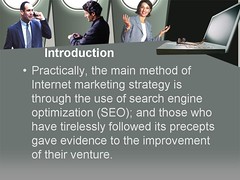Optimizing your website can help dramatically, but there are right and wrong ways to go about it. These tips will increase your page ranking while maintaining a good standing with your search engines.
Language meta tags should be used for websites written in a different language than English. Your search engine rankings will improve for searches in that language.
Don’t lock yourself in an ivory tower when choosing your site’s keywords. Find out what a person is likely to type into a search engine when looking for a website like yours.
Keyword Density
When you are trying to optimize your website for the search engines, having a lot of keyword density is very important. Your keyword density should be kept under 20 percent, which will prevent your site from being targeted as spam.
AP Style is generally a much more effective tool than SEO style. This means that keywords should be repeated as often as you can without making the flow of the writing stilted. Doing this will help to improve your rankings because of keyphrase density.
Search engine crawlers are always scouring the web for fresh material and updated content. Whenever you update your blog or content, you are making your site more visible to search engines. Not only that, if your articles are really good, other people will publish your links. Interesting content will also draw return traffic, especially from people who have recommended the content to their friends.
Look into exactly how much experience they have. Make sure you understand the risks of hiring a SEO expert.
Server Headers
If you want to maximize your SEO attempts, be sure to look at your server headers. Having your server headers set up improperly is one way to really hold back your success. If you need to redirect pages, you must ensure that each server header includes an error or redirect status.
Incorporate keywords and keyword phrases into your HTML title tag to improve your SEO. When a search engine looks for webpages they put more emphasis on the content that is in title tags so it is crucial to have your keywords represented in them. Place the most relevant keywords there, and watch as potential customers flock to view your information!
Think like a web surfer and ask yourself what queries they would use to find your site. Then, make sure you have the keywords you came up with all over your site. While you want to make those keywords present in your titles and in the content of your articles, you need to take caution. Using the same keyword too often can flag your site as spam, and that will really hurt your rankings.
It is very easy to make mistakes when trying to deal with search engine optimization. The tips you just read offer you many proper ways to increase your target audience and how to avoid being unfairly blocked by a search engine.
